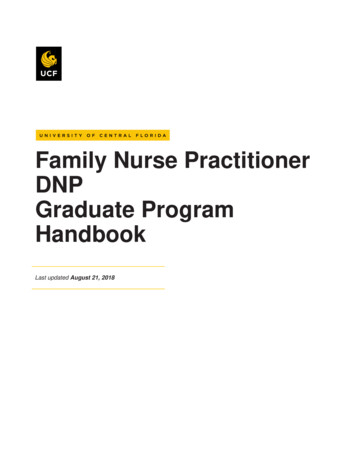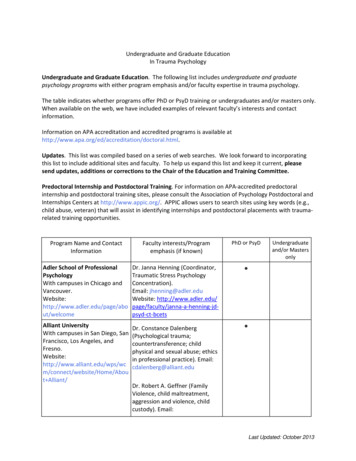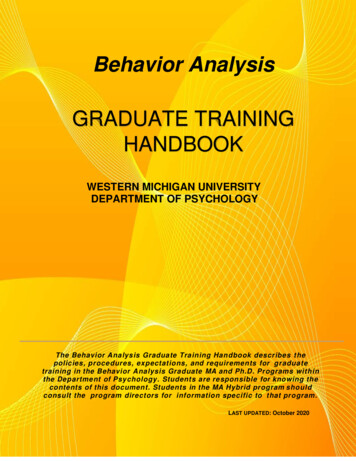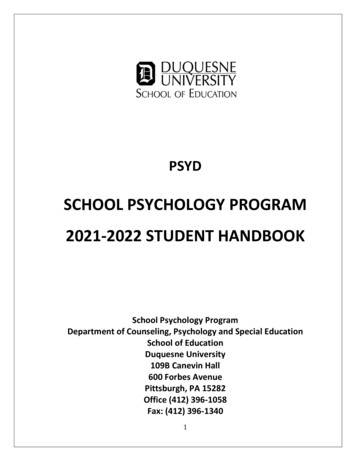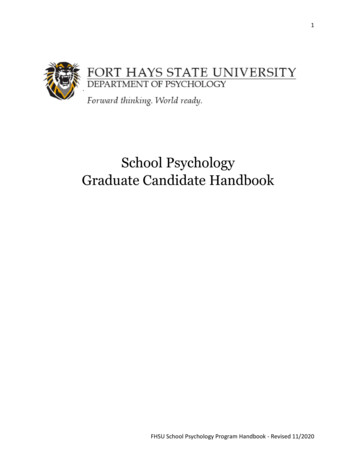
Transcription
1School PsychologyGraduate Candidate HandbookFHSU School Psychology Program Handbook - Revised 11/2020
2Table of ContentsApplication Materials and Procedures . 4Masters in Psychology (School) degree (M.S.): . 4Education Specialist Degree in School Psychology (Ed.S.): . 5The Masters Comprehensive Exams for Psychology (School). 6The Ed.S. Comprehensive Exam for School Psychology . 9Practicum and Internship Field Placement Considerations. 9Intern Field Site Application Process. 11Licensing Requirements . 11Professional Organizations .12Research Requirements .12Field Study (“Thesis”) (On-Campus Ed.S. Program Only) . 12School Psychology Portfolio Guidelines. 20Policies . 25Policy on Research . 25Policy on Importance of this Document . 25Appeals Policy . 25Academic Integrity, Ethical Standards, and Professional Conduct . 25Additional Psychology Graduate Program Policies . 26Policy on Enrollment. 26Policy on Continuous Enrollment . 26Policy for Academic Standards . 27Program of Study . 27MS Psychology (School) Program Requirements . 30EdS School Psychology Program Requirements . 30FHSU School Psychology Program Handbook - Revised 11/2020
3FHSU Psychology Department ChairDR. DHARMA JAIRAMDepartment Chair & Associate ProfessorMartin Allen Hall 102(785) 628-4170d jairam2@fhsu.eduFHSU School Psychology Program DirectorBRETT BIERBELE, ED.S.Director of the School Psychology Program & Assistant ProfessorMartin Allen Hall 219(785) 628-4147bmbieberle@fhsu.eduFHSU School Psychology FacultyANGIE HOWARD, ED.S.InstructorMartin Allen Hall 107(785) 628-4405amhoward2@fhsu.eduJENNIFER KITSON, ED.S., NCSPInstructorMartin Allen Hall 105(785) 628-5855jjkitson@fhsu.eduFHSU School Psychology Program Handbook - Revised 11/2020
4Application Materials and ProceduresAdmission requirements and acceptance decisions to the school psychology graduate program (for theM.S. and then the Ed.S. degrees) are provided here. Acceptance is determined by the psychologydepartment faculty. Decisions are based on the applicant’s past academic achievement, experiences, andattributes appropriate for a career as a professional school psychologist; including commitment andability to work effectively with children/youth and adults, and necessary to demonstrate professional andinterpersonal essential functions. Previous experience in training and work with children is helpful (e.g.,educator, mental health professional, youth services work, volunteer work in community with child/youthactivities or as a camp counselor).Effective March 16, 2021, all first-time applicants to the FHSU School Psychology Program must apply atthe M.S. level. If upon acceptance and review of transcripts, the committee believes that a candidate maybe qualified to begin at the Ed.S. level, the committee will request that the applicant provide relevantsyllabi to review for equivalencies of coursework to make a determination regarding possible entry at theEd.S. level.Applicants are expected to describe a commitment to complete both the Masters and Ed.S. programs (66total credit hours, required for provisional licensure/certification - including 600 hours of supervisedpracticum experience, and followed by a 1200 hour supervised internship). The M.S. and Ed.S. degreeprograms have separate application and acceptance processes. Required components of both degrees arenecessary to complete the program, to obtain licensure/certification as a school psychologist.Requirements and required application forms are provided at http://www.fhsu.edu/psych/schoolpsychology/.The FHSU school psychology program follows a cohort science-practitioner model. Currently, admittanceinto the program is established for a Fall cohort start date. A completed application should be submittedto the FHSU Graduate School by March 15, for priority consideration of acceptance into the followingacademic Fall Semester.Courses may be considered from another university, or previously from FHSU, however no more than 6hours can be transferred for the M.S. degree or for the Ed.S. degree. Courses that were applied toward adegree cannot be transferred.Transcripts and review of course syllabi can be completed to determine equivalent courses from anotheruniversity that may either be transferred in, or that may be waived in the program of study and replacedwith an elective course approved by the advisor, and with recency of completion of core courses within thepast 3 years for the following courses: PSY 840 and PSY 880 in MS, and all PSY courses in EdS.Masters in Psychology (School) degree (M.S.):Effective March 16, 2021, all first-time applicants to the FHSU School Psychology Program must apply atthe M.S. level.Acceptance to the Masters in Psychology (School) degree program (M.S.) is determined by the psychologydepartment faculty, taking into consideration a review of the following items as evidence of probablesuccess:1.Exam scores on the Graduate Record Exam (GRE) or Miller's Analogy Test (MAT), current withinthe past 5 years.2. A personal statement.3. Response to two vignettes.4. Grade Point Average: The applicant must have an undergraduate GPA of 3.0 on a 4.0 scale.5. Official transcripts are required from each college attended.FHSU School Psychology Program Handbook - Revised 11/2020
56. Recommendation letters from two references who know the applicant well and can provideinformation used to evaluate the applicant’s likelihood of being successful to complete theprogram.7. Background coursework in psychology (12 hours minimum, a 3 credit hour research or statisticscourse in any area).8. Successful completion of a background check after acceptance to the program.The application requirements provide documentation used by the psychology department faculty inmaking decisions for acceptance, given the rigorous program expectations and the large number ofapplications received for the limited number in each cohort that we can accommodate. The psychologydepartment faculty makes decisions on complete applications, selecting top applicants for acceptance.Decisions take into consideration all of the required materials (GRE or MAT scores, transcripts and GPA,letters of recommendation, personal statement, answers to the interview questions, the required 12 hoursof psychology courses and a research or statistics course). Information about the program applicationprocess and the forms is provided at ed application materials should be submitted to the FHSU graduate school, for the onlineapplication and additional forms required by the psychology apply/Education Specialist Degree in School Psychology (Ed.S.):Candidates who are in their final semester of the M.S. Psychology School program at FHSU, must applyfor acceptance for the Ed.S. Degree in School Psychology. Effective January 1, 2021, all first-timeapplicants to the FHSU School Psychology Program must apply at the M.S. level.Information about the program application process and the forms is provided ired application materials should be submitted to the FHSU graduate school, for the onlineapplication and additional forms required by the psychology apply/The requirements below are minimum requirements for consideration of admission. Admission to theEd.S. program is competitive; therefore, meeting the minimum requirements does not guaranteeadmission to the program. All applicants must apply for admission to the Ed.S. program.1.Two professional letters of recommendation (one from someone who can attest to competency,ethics, and ability to complete the Ed.S. coursework and internship; one from someone who hassupervised the applicant in a group activity in a work or academic setting) Applicant should advise their letter writers to include with the written recommendations: cover letter addressing the applicant’s: (1) work ethic, (2) assessment skills, (3)professional ethics, (4) competency, and (5) ability to manage professionalrelationships Provide a specific example of a difficult situation you have observed the applicantdeal with effectively Complete the interpersonal interactions rating table2. 3.0 GPA undergraduate coursework, and 3.25 GPA in graduate coursework3. No C or lower in graduate coursework (exception is C in statistics course)4. .5. Master’s degree in psychology or a program of studies that is substantially equivalent to thecoursework requirements of the FHSU, MS concentration in School Psychology, includingdocumentation of oral or written comprehensive exams. A secondary option to comprehensiveexams is to provide scores from designated sections of the EPPP psychology exam.FHSU School Psychology Program Handbook - Revised 11/2020
66. If courses equivalent to the FHSU PSY 840 Appraisal of Children and PSY 880 Methods in SchoolPsychology have not been taken within the past 3 years, they will need to be taken as a conditionof admittance.7. GRE or MAT (scores in the past five years prior to your date of admission)8. Transcripts9. Vita10. Successful completion of background check11. Personal Statement (see supplemental material) including: Statement of goals for the Ed.S. program and future plans as a school psychologist Other information the applicant would like us to know, which may provide theadmissions committee with a more detailed picture of the applicant’s qualities12. Responses to vignette scenario questions (see supplemental material)1. Ed.S. Statements2. Candidates havea maximum of three years to complete the M.S. program and three yearsto complete the Ed.S. program.3. Keep all textbooks, course notes, materials, and syllabi – to prepare and study for comprehensiveexams, to use in developing your professional portfolio, to support you during practicum andinternship experience and to reference as a professional school psychologist.4. Requirement to purchase professional liability insurance for practicum experience andinternship.The Masters Comprehensive Exams for Psychology (School)The FHSU Graduate School requires comprehensive examination for each graduate degree. “Eachapplicant for a graduate degree must satisfactorily pass a comprehensive examination over the subjectfields of the program. The comprehensive examination is not merely a re-examination of materialscovered in coursework, but it is a test of the graduate degree candidate's ability to integrate materials fromthe graduate major and any related or supporting mps/The Masters Comprehensive examination meets proficiencies for FHSU Graduate School LearnerOutcome #1: Each graduate student will demonstrate advanced disciplinary knowledge, skills, andabilities - as measured on the comprehensive examination.All candidates in the school psychology graduate program at Fort Hays State University must pass theComprehensive Examination as part of their requirements for graduation. The department considers theComprehensive Examination a crucial aspect of each candidate's education, and expects high qualityperformance on the examination.The Comprehensive Examination is not a series of examinations of separate content areas. Instead, unlikea final examination in a course, the Comprehensive Examination requires candidates to synthesize andintegrate material from diverse areas of psychology. This synthesis and integrations requires preparationbeyond mere coursework. In order to recognize the complexity of behavior, candidates take courses in thevarious branches of psychology. The Comprehensive Examination enables candidates to demonstratetheir knowledge of the varied causes of behavior and the processes of influence of a specific area onbehavior. The organization of information in preparation for the Comprehensive Examination shouldprovide candidates with an overview of all branches of psychology.The Psychology Department faculty and the School Psychology Committee are committed to preparationof and providing assistance and constructive feedback to each graduate candidate, to assist each in theFHSU School Psychology Program Handbook - Revised 11/2020
7potential to complete required courses and other program requirements. Department faculty advance therigorous academic program by requiring knowledge and skill outcomes, assimilation, synthesis andintegration of information in applied situations, and promotion of professional and interpersonalessential functions. The profession of school psychology requires a quality standard of practice, as highstakes decisions with life altering consequences are made for children/youth, based on a schoolpsychologist’s application of knowledge and skills in practice.The Comprehensive Examination spans all required program courses and is designed to demonstratemastery and application of knowledge learned within the M.S. program, integrating and synthesizing allapplicable course concepts and knowledge into each response to the questions. This synthesis andintegration requires preparation beyond mere coursework.In preparation for comprehensive exams, candidates are encouraged to review all required M.S. coursematerial (e.g. textbooks and additional course readings, papers and test completed during courses,PowerPoints and other course materials) and may contact instructors to ask questions about coursecontent.The Comprehensive Examination requires synthesis and integrative thinking skills that may bechallenging for some students who may have performed well in their graduate courses. Although schoolpsychology M.S. courses have assignment applications requiring synthesis and integration of knowledge,the Comprehensive Examination requires broader expectations and skill sets encompassing applicationsfor synthesis and integration of knowledge from all of the courses, as differentiated from meetingexpectations of an individual course. The Comprehensive Examination is designed to requireassimilation, synthesis, and integration of knowledge and skills necessary to applications in practicalsituations.When enrolling in the last semester of the M.S. program, candidates submit intent to graduate and signup for comprehensive written exams. The school psychology M.S. Comprehensive Examination is essaywritten format, taken in online platform (4 hours a day, over two consecutive days), during the lastsemester (Fall, Spring, or Summer) the candidate is completing the M.S. coursework. Exam questions arewritten by members of the School Psychology Committee, covering learning objectives/outcomes fromrequired courses in the Master’s school psychology program, and requires synthesis and integration withan application focus. The candidate must pass all sections of the examination, as a requirement forcompletion of the M.S. degree.Candidates who anticipate graduation in the summer term must complete comprehensive exams after thesummer term has ended and before the fall semester has begun.To complete the M.S. School Program, students will take the School Specialty Exam which includes:a) The evaluation of Case Studies, appropriate to the School program (4 hours),b) A Specialty Area including Ethics (2 hours), andc) A Methodology Area appropriate to the School program (2 hours).Satisfactory performance on both sections (Methodology; and Case Studies and Specialty Area) of thisexamination is a requirement for a graduate degree. Candidates who do not perform satisfactorily canretake the examination section at the next regularly scheduled examination period. Candidates maychoose to appeal the decision, following the Graduate School Appeals Policy and completing a t-students/A Comprehensive Examination can be attempted two times without petition. If the examination is failed aFHSU School Psychology Program Handbook - Revised 11/2020
8second time the candidate must petition the Psychology Graduate Faculty for permission to retake theexamination a third time. Petitions must be submitted six weeks prior to the examination date. Thepetitioning candidate must present a detailed plan of study. If the Department Faculty, after review, feelsthe candidate is capable of appropriate preparation, the Faculty may grant the petition to attempt theexamination for a third and final time. Students have two years from the time they first attempt theComprehensive Examination to successfully pass the examination.Examinees will either complete the comprehensive examination on campus, or join in a virtual format.Those off campus will connect by computer to the virtual format, using a web link and their computerwebcam and microphone. The essay questions will be answered in word documents that are saved to thecomputer and then submitted in a Blackboard assignment format. During the exam, technology supportwill be available to troubleshoot problems. A member of the School Psychology Committee will beconnected to examinees to monitor students via webcam during the exam time, to respond to any issuesand to assure completion of responses without accessing books, notes or other sources.Comprehensive Examination Grading. To assure blind scoring by members of the SchoolPsychology committee, candidates will submit responses, using a 5-digit code rather than name, which thepsychology department administrative assistant assigns to each candidate. The psychology departmentadministrative assistant will then access the completed exam responses submitted digitally, deidentify thedigital documents, and provide access to the deidentified digital documents to each of the schoolpsychology committee members. Both sections (Methodology, and Case Studies and Specialty Area) willbe read independently by each member of the school psychology committee to independently score, usingrubrics. Ratings on the sections are not to be comparative within the group of students taking the exam.Scoring is not relative to the best or worst answers for a given year nor is there a curve or quota for thepercentages of students who pass or fail. The standard is the faculty's judgment, referencing the rubrics,of the expected performance of a candidate to integrate and synthesize concepts, as they near completionof the Masters program of graduate study in psychology.The school psychology committee members will then meet, review rubric scores and comments eachreader has independently noted, to arrive at agreement and a decision concerning the recommendation topass, pass with remediation, or fail on each of the two sections for each candidate. Remediation isconsidered only if responses are technically accurate (e.g., there are no inaccuracies) but there areminimal points in one or two questions (not in a full section, or more than one section) that require acandidate to provide additional detail. After reaching agreement, the candidate number code is matchedto each candidate’s name, revealing identities. After candidate number codes are matched to eachcandidate, the school psychology program director will utilize anti-plagiarism software (SafeAssign) toassess all submitted responses for plagiarism. Any indication of plagiarism on a student’s submittedcomprehensive exams may result in a committee decision of fail for the comprehensive exam containingplagiarized information. More information about FHSU’s Academic Honesty Policy can be ok/ch 2 academic honesty/.The committee will make their recommendations to the Psychology Department. Candidates will benotified of the decision by the Chair of the Comprehensive Exam, providing the decision and the rubricscoring feedback. If remediation is necessary, the candidate will be requested to complete the remediationin a specified time frame. The decision will be communicated to the Graduate School Dean. The Dean ofthe Graduate School will provide official notification by letter of the decision concerning theirperformance on the Comprehensive Examination. Candidates may choose to appeal the decision,following the Graduate School Appeals Policy and completing a t-students/FHSU School Psychology Program Handbook - Revised 11/2020
9The Ed.S. Comprehensive Exam for School PsychologyThe FHSU Graduate School requires comprehensive examination for each graduate degree. “Eachapplicant for a graduate degree must satisfactorily pass a comprehensive examination over the subjectfields of the program. The comprehensive examination is not merely a re-examination of materialscovered in coursework, but it is a test of the graduate degree candidate's ability to integrate materials fromthe graduate major and any related or supporting mps/The ETS Praxis 5402 exam meets proficiencies for FHSU Graduate School Learner Outcome #1: Eachgraduate student will demonstrate advanced disciplinary knowledge, skills, and abilities - as measured onthe comprehensive examination.All candidates in the school psychology graduate program at Fort Hays State University must pass theComprehensive Examination as part of their requirements for graduation. The school psychology Ed.S.comprehensive exam is the ETS Praxis 5402, and the comprehensive exam fee is the responsibility of thecandidate. When enrolling in the last semester of the Ed.S. program, candidates submit intent to graduateand sign up for comprehensive written exams.The ETS Praxis 5402 exam is administered at college/university test centers in an online format, coveringschool psychology and special education concepts and is aligned with NASP’s 2010 standards and 10domains of practice. Determining the best answer to each question is required, using knowledge fromcourses in the M.S. program and the Ed.S. program. Students are encouraged to consider taking thePraxis in the last semester of the Ed.S., in February or March, as coursework is being completed andknowledge from courses has been applied in practicum experiences.A score of 147 on ETS Praxis 5402 is required for provisional licensure as a specialist in school psychologyfrom the Kansas State Department of Education (KSDE), necessary to complete the supervised one-yearinternship of 1,200 hours, and then to apply for full licensure.The Praxis questions address four content categories:I.II.III.IV.Professional Practices, Practices that Permeate All Aspects of Service DeliveryDirect and Indirect Services for Children Families, and Schools (Student-Level ServicesSystems-Level ServicesFoundations of School Psychological Service DeliveryTo obtain additional information in preparing for the Praxis https://www.ets.org/s/praxis/pdf/5402.pdfPracticum and Internship Field Placement ConsiderationsA primary consideration in a practicum and intern placement is the adequacy and eligibility of a schoolsystem as a training site. The following considerations provide general criteria for practicum and internplacement:There should be one individual in the school district/cooperative directly responsible for the supervisionof the candidate. The on-site field supervisor shall be responsible for no more than two (2) interns orpracticum candidates. This person should be a licensed/certified school psychologist with three or moreyears of experience excluding internship. The School Psychology Program committee must approve thesupervising field school psychologist. It is the responsibility of the participating field supervisor topresent: A brief vita of training and experience, andFHSU School Psychology Program Handbook - Revised 11/2020
10 Documentation of licensure/certification in the state where practicum or internship is completed.The documents must be provided no later than the orientation/MOA meeting at the beginning of the fieldplacement, and will be kept on file with the University supervisor.The field supervisor, candidate, and the school administrator responsible for special education servicesmust each be provided with a copy of the course syllabus, the Kansas State Department of Educationstandards for school psychology, and the Memorandum of Agreement (MOA) for signature by theuniversity supervisor, the field supervising school psychologist, the candidate, and the local educationagency administrator. The requirements and standards within all three documents will be reviewed by theuniversity supervisor with all parties, who will agree on the practicum or internship agreement that thecandidate will be provided a commensurate experience. The responsibilities of all parties are defined inthese documents.Although the specific terms vary, both within and across local education agencies, the following policiesare observed for practicum and internship field experiences:1. The practicum and the internship field experiences are completed during the regular academic year(Fall/Spring).2. Candidates will meet all eligibility requirements of the School Psychology Program field placementbefore beginning; including requirements of liability insurance, background check at the level required bythe field site, and membership in NASP.3. Candidates will be placed with an experienced field supervisor, a school psychologist who holds fulllicensure, and has three or more years of experience, excluding internship.4. The field site supervisor has a supervisory relationship that is clearly differentiated from that ofconsultant or mentor.5. If the practicum candidate completes duties for the school district or cooperative outside of the 600hours of practicum, it is understood that such duties are not represented as practicum, and that the dutiesdo not require credential as a school psychologist.6. Practicum activities must not be completed in any schools where the practicum candidate may also beemployed for different duties/position.7. Candidates may not hold a full-time job concurrently with the field experience.8. Practicum candidates will attend regularly scheduled supervision meetings, connecting in a virtualformat (computer camera and microphone) with the university practicum supervisor and practicumcandidates as a group, two hours synchronously each week while the university is in session.9. A minimum of 600 logged hours in the practicum field site experience.10. A minimum of 1200 logged hours in the internship field site (full-time for two semesters or halftimefor four semesters).11. The majority of the field experience must be completed in a school setting, during regular schoolhours.12. The field experience must be completed in schools that follow U.S. education laws.13. The Candidate must purchase professional liability insurance for both practicum and internshipexperiences. The following notation taken from the MOA for Practicum and Internship:The University does not provide candidates with blanket insurance coverage for workman’scompensation or for compensation insuring them against liability for actions or inaction occurring inthe practicum setting. Candidates participating in the School Psychology Practicum Program mustpurchase an experiential learning policy. Coverage is available for purchase through your membershipin NASP. You may obtain information about liability insurance e the Ed.S. degree is awarded, and KSDE or the state agency responsible for licensure or certificationin the state the internship will occur has granted a provisional license, the graduate should schedule aninternship orientation meeting with the university internship supervisor, field supervising schoolpsychologist, and special education administrator. This meeting may be held at the internship site, or iftravel distance is a barrier this will be conducted through virtual means (e.g., Zoom BlackboardCollaborate). At this meeting with university su
FHSU School Psychology Program Handbook - Revised 11/2020 . 6. If courses equivalent to the FHSU PSY 840 Appraisal of Children and PSY 880 Methods in School Psychology have not been taken within the past 3 years, they will need to be taken as a condition of admittance. 7. GRE or MAT (scores i
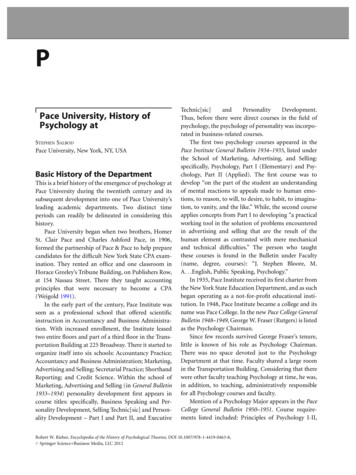

![OPTN Policies Effective as of April 28 2022 [9.9A]](/img/32/optn-policies.jpg)

